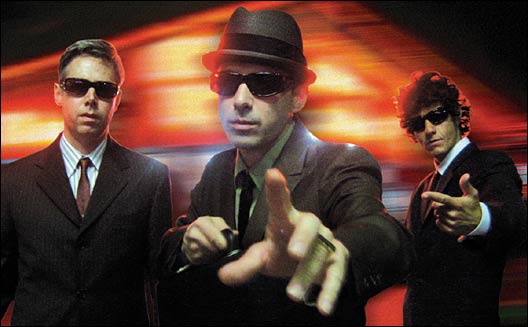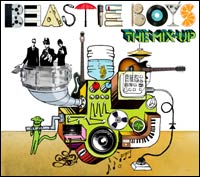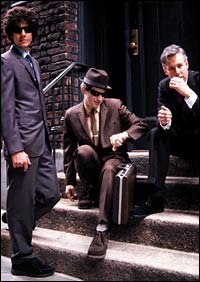
“I’m recording [this interview] so I can send the tapes to Jerry Lewis; he archives all of my interviews,” Beastie Boy Mike D deadpanned at the other end of the phone line. “In addition to being an all-around comedian and famous in France, he’s very much a stickler for recording interviews.”
It was a bizarre response to my routine opener about recording interviews, but perhaps not entirely unexpected. I’d read that the hip-hop punk-rockers — known for hits like “Brass Monkey,” “Fight for Your Right (to Party!),” and “Sabotage” — were sometimes flippant with the press.
But as soon as I gathered my wits and began asking him about his personal environmental ethic and raising his kids green, Michael Diamond got serious. Which also shouldn’t have surprised me: The Beastie Boys have long been serious about their social activism, donating songs and ticket sales to various charities and organizing major events like the Tibetan Freedom Concert in 1996 and the New Yorkers Against Violence Concert a month after 9/11.
Tomorrow, the group — which includes Diamond (Mike D), Adam Horovitz (Adrock), Adam Yauch (MCA), and Michael Schwartz (Mix Master Mike) — will play Live Earth London, one of a number of concerts around the world on 7/7/07 to raise awareness about climate change. It was “instant acceptance” when they were asked to participate, Diamond says, putting them on stage with other major artists like Madonna, Red Hot Chili Peppers, Black Eyed Peas, even a reunited Spinal Tap.

I spoke to Diamond while he was in New York just before leaving for the group’s tour of European music festivals in support of this year’s all-instrumental album The Mix-Up. Our call was short but chatty; Diamond seemed sincere about his green leanings, and sported a healthy dose of political cynicism. I’d definitely consider the interview ill communication … I wonder what Jerry Lewis thought.
You’ll be playing Live Earth in London. How did you get involved with that?
Global warming is something that needs everybody’s immediate attention and action. And it’s not something anybody can afford to wait on; it’s very, very clear. So somebody came to us with the idea of Live Earth raising so much consciousness, so much awareness … it was pretty much an instantaneous “yes” on our part.
How would you describe your environmental ethic?
My environmental ethic?
Are you doing anything with your tour …
When we get back to doing our own tour here in the U.S., there are a bunch of initiatives that we’re starting work on that won’t have fully manifested until the tour starts — like the trucks and the buses on our tour are going to all run on biodiesel.
We’ve kind of informed our audiences about the concept of carbon offsets for every event that we’re doing and how much energy we [use]. We’re going to hopefully have pretty extensive tabling, but we haven’t sorted out exactly who we’re working with, in terms of groups.
And then we’re also trying to get this thing going where you turn in, say, 10 water bottles at the venue and you get an incentive for that — our own kind of incentive-based recycling program at each venue.
That’s cool. They were actually doing that at Sasquatch in May.
Yeah. That was what kind of inspired us. We bit their idea, but I think they’ll be happy about that.
Yeah I think so, too. I was volunteering there.
I was impressed. At Sasquatch, I had a couple people come up to me, like, “Would you mind signing this record? I turned in” — you know, whatever it was — “10 water bottles, 20 water bottles, and I got this record of yours.”
The records were 200 bottles, so that was a lot of recyclables.
So it worked.
Well, what about in your personal life?
Basically, I just try to, as much as possible, tread lightly, which is not so easy here in New York City. But I guess, on the other hand, the flip side is that I walk to and from work every day; I walk my kids to school and then we walk back. So a lot of times, I can go days without having to get in an automobile.
That’s the good thing about big cities.
And if I get lucky and I get a hybrid taxi, then I’ve really done well.
So you have two sons. How old are they now?
One will be 3 this summer. And one’s going to be 5.
And how are you passing along your environmental ethic to them?
It’s pretty interesting. With them, they’re already so recycling-aware. As soon as they finish a thing of yogurt, right away, instead of throwing it out, they say, “Daddy, this gets recycled, right? We recycle this, right?”
We really just try to be aware of things like when we leave the bathroom, let’s turn this light off and explain why and the energy it’s using. Really I think what I try to explain to them is our responsibility: the care of the land and the environment. As humans, this is our responsibility. It’s something we have to take very seriously.
Actually, it’s pretty amazing. I think kids now — I’m hoping — seem to be brought up with a lot more awareness. Like one of my sons yesterday did a field trip to the Bronx Botanical Gardens. So they were planting plants, and he came back and he was telling me so much about what the plants do and how they help our air. I was really psyched that he actually had this hands-on interaction. It made it all so much more immediate for him.
Do you keep up with politics at all? Who are you favoring in the presidential race?
I’m undecided in terms of Obama and Clinton, although I haven’t seen what Obama’s or Clinton’s environmental stance has been … Although of course, you know, the front page of the Times today: “Bush is coming around …” [Laughs]
Yeah. I don’t know if I believe that.
Bush is really coming around now … [Laughs]
I know a few years ago you worked with Alanis Morissette and some environmental groups to get [Interior Department official] Steven Griles out of office. How did you feel when he resigned and then it was revealed he was involved in the Abramoff scandal?
It felt good having a small victory; although, on the other hand, it was so small. It’s such a small amount of work because it was OK, then the issues were drilling the Alaskan wilderness, there was the brilliant plan put forth by the Bush administration to start logging our own national forests — which would supposedly keep us safer from fires.
Right, right. Healthy Forests.
Clear-cut the forests before they can burn!
Those were two things that … instantly motivated me to become active. So maybe it’s a short-term victory, but still I just feel like all these things are being threatened every day. It kind of requires constant vigilance and a constant effort on the part of everybody, really, unfortunately.
Until we one day, hopefully, have a government that actually serves the people and listens to the people’s interests as opposed to business’s interests, yeah, it’s going to require constant vigilance on the part of the people.

The Beastie Boys say it’s time to fight climate change.
Photo: Vanya Edwards
What do you think about the focus on bling and sort of consumerist, materialistic stuff in hip-hop culture right now?
I’m a bit torn, because on the one hand, I think that people make a bit too much of it because it’s always sort of been an element of hip-hop. There’s kind of like the boastful part of hip-hop, and an extension of that at times involves boasting about what you got — could be skills or possessions.
I think it falls on me, as a parent, to instill whatever the values say to my kids — in terms of: Do they want to spend all their money on a pair of 22-inch rims? Or would they rather see some people eat? But that’s gonna come from me, not from a song.
Back in your early days, you were known for wearing a gold Volkswagen on a chain around your neck …
Yeah, see now that’s recycling.

